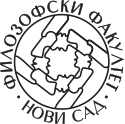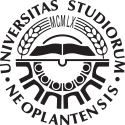14PSPS118 - Philosophy of Media
| Course specification | ||||
|---|---|---|---|---|
| Course title | Philosophy of Media | |||
| Acronym | 14PSPS118 | |||
| Study programme | Psychology | |||
| Module | ||||
| Type of study | first degree undergraduate academic studies | |||
| Lecturer (for classes) | ||||
| Lecturer/Associate (for practice) | ||||
| Lecturer/Associate (for OTC) | ||||
| ESPB | 3.0 | Status | ||
| Condition | No additional reguirements. | Oblik uslovljenosti | ||
| The goal | The students will become acquainted with the philosophichal approach to media and also with the changes in our perception of reality made by the media and the world views which emerged parallel to the development of media. | |||
| The outcome | The students are enabled to recognize the relevance of media not only for transferring, distributing and storing knowledge in different discourses and social institutions but also for its forming and accepting. They will recognize mediality as a phenomenon sui generis and analyze it in the adequate way. | |||
| Contents | ||||
| Contents of lectures | The task of philosophy of media: the study of forming and transfer of knowledge by media (writing, print, photography, film, radio, television, internet etc.). Wide and narrow sense of »media«. Transfer of information and communication. Medial revolutions and innovations. Media and public opinion. Media and social power. The problem of media deception. Simulacra and simulation. Transformation of perception and cognition determined by use of media. Medial construction of reality. Ethics and aesthetics of media. Different types of media theories: critical, (post)structuralistic, technical, constructivistic theories etc. Social history of media. History of philosophy of media. | |||
| Contents of exercises | Text analysis, discussion of presentations | |||
| Literature | ||||
| ||||
| Number of hours per week during the semester/trimester/year | ||||
| Lectures | Exercises | OTC | Study and Research | Other classes |
| 2 | 1 | |||
| Methods of teaching | Dialogic method, text analysis, presentation of video footage | |||
| Knowledge score (maximum points 100) | ||||
| Pre obligations | Points | Final exam | Points | |
| Activites during lectures | 10 | Test paper | ||
| Practical lessons | 15 | Oral examination | 60 | |
| Projects | 15 | |||
| Colloquia | ||||
| Seminars | ||||

